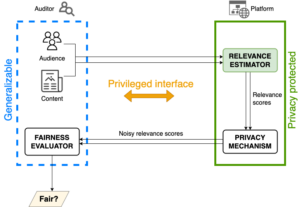Our new paper “Having your Privacy Cake and Eating it Too: Platform-supported Auditing of Social Media Algorithms for Public Interest” will appear at The 26th ACM Conference On Computer-Supported Cooperative Work And Social Computing (CSCW 2023).
From the abstract:

Concerns of potential harmful outcomes have prompted proposal of legislation in both the U.S. and the E.U. to mandate a new form of auditing where vetted external researchers get privileged access to social media platforms. Unfortunately, to date there have been no concrete technical proposals to provide such auditing, because auditing at scale risks disclosure of users’ private data and platforms’ proprietary algorithms. We propose a new method for platform-supported auditing that can meet the goals of the proposed legislation. The first contribution of our work is to enumerate the challenges and the limitations of existing auditing methods to implement these policies at scale. Second, we suggest that limited, privileged access to relevance estimators is the key to enabling generalizable platform-supported auditing of social media platforms by external researchers. Third, we show platform-supported auditing need not risk user privacy nor disclosure of platforms’ business interests by proposing an auditing framework that protects against these risks. For a particular fairness metric, we show that ensuring privacy imposes only a small constant factor increase (6.34x as an upper bound, and 4x for typical parameters) in the number of samples required for accurate auditing. Our technical contributions, combined with ongoing legal and policy efforts, can enable public oversight into how social media platforms affect individuals and society by moving past the privacy-vs-transparency hurdle.
A 2-minute video overview of the work can be found here.
This paper is a joint work of Basileal Imana from USC, Aleksandra Korolova from Princeton University, and John Heidemann from USC/ISI.